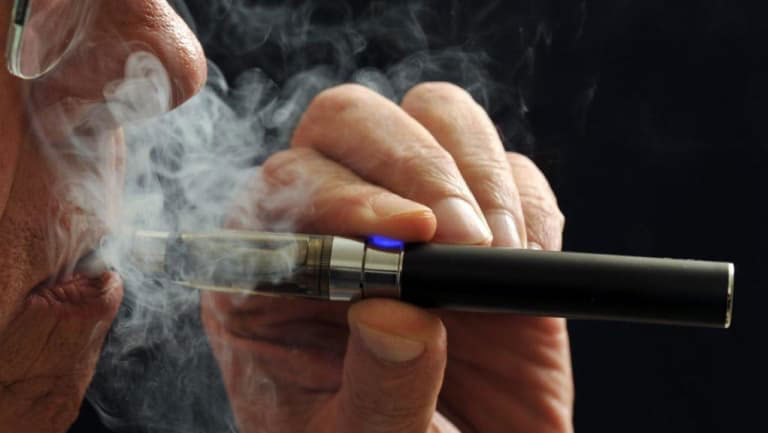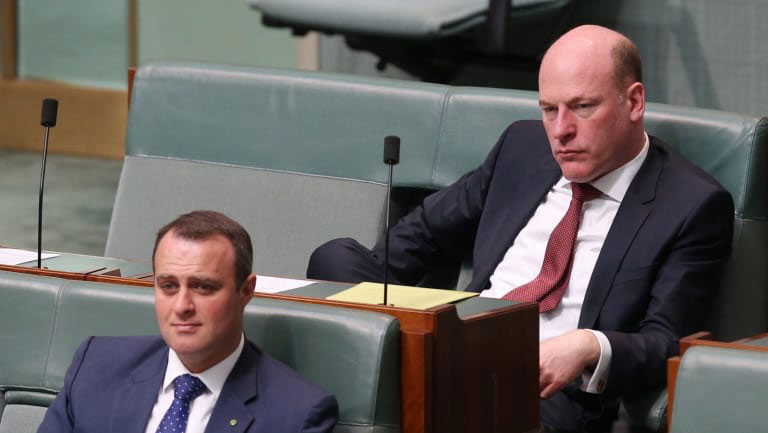Michael Koziol
9 June 2018
The Age
Karen Counter isn’t quite sure what side of the law she’s on, but she’s 100 per cent sure she is right. The GP from the NSW north coast is signing up to proliferate electronic cigarettes – a product that has sparked outright war within her profession and disagreements within the government.
E-cigarettes containing nicotine are illegal in Australia, unless the user has a prescription to help them quit smoking. But very few doctors – perhaps only a dozen nationwide – are willing to do so at present because it contravenes medical guidelines.
E-cigarettes containing nicotine remain banned in Australia without a prescription.
Photo: AP
Increasingly, Australia stands alone. Vaping nicotine is legal in Britain, the US and Canada, and New Zealand effectively legalised it courtesy of a court decision in May. But in Canberra, Health Minister Greg Hunt remains vehemently opposed.
“The overwhelming medical advice and evidence is that it’s likely to lead to the uptake of smoking and we cannot support that,” his spokesperson says.
But the movement for change is growing. A group of Liberal MPs are intent on prosecuting the case for legalisation and believe they can get the majority of their party onside. Tobacco lobbyists are also on the cause. Meanwhile, others are taking the issue into their own hands.
“We can’t sit around and watch people die”: GP Karen Counter plans to sign prescriptions for liquid nicotine online.
Photo: Supplied
Counter is one of two doctors partnering with a fledgling firm, Nicovape, to sign prescriptions for clients who fill out an online questionnaire. The firm says the survey is more controlled and more comprehensive than a standard in-person medical exam. Successful patients will receive nicotine in the mail for $10 a pod (equivalent to about 30 paper cigarettes).
Counter works in Wauchope and specialises in smoking cessation. She has many disadvantaged patients with illnesses related to heavy smoking, and is convinced e-cigarettes are the solution for people who have tried other means of quitting.
“I feel it’s my duty of care,” she says. “We can’t sit around and watch people die, waiting for 100 per cent perfect evidence.”
Counter says she would be paid $5 per prescription she signs. Nicovape is yet to get underway, but it has a website that optimistically boasts of saving 1 million Australian lives by 2021. Its founder Ryan Boulton concedes the scheme is in a “grey legal area”, but says he is playing by the rules. He hopes to build an evidence base that e-cigarettes can actually help people quit.
Proponents of e-cigarettes point to recent and substantial research from Public Health England, a British government agency, that found vaping was 95 per cent less harmful than smoking and there were “substantial health benefits” from making the switch.
“No one is saying that there’s any doubt any more about the lower harm profile of these products,” Boulton tells Fairfax Media. “Their concerns are about the efficacy.”
But that’s not strictly true. The new president of the Australian Medical Association, Tony Bartone, has struck a defiant note about e-cigarettes in his first two weeks on the job. He says the jury is still out on every aspect of vaping, including the health impacts compared to traditional smoking, and warns of “unintended consequences” down the track.
“It may be less harmful on the basis of current evidence – but it may also be worse,” Bartone says. “There’s no irrefutable and reliable evidence that they are safe, that they don’t pose a future risk to the users. If the evidence changes, we’ll be the first people to say we need to re-evaluate things.”
Those words, alongside similar testimony from the National Health and Medical Research Council, have ultimately convinced Hunt and his Labor counterpart, Catherine King, to oppose legalisation. A majority of MPs in a recent parliamentary inquiry also recommended against change.
In a curious twist, inquiry chair Trent Zimmerman and fellow Liberal MP Tim Wilson dissented from the majority and called for immediate legalisation with safeguards. The existing evidence is clear enough, they argued, and the “black market” is thriving regardless. Liberal MP Andrew Laming also dissented, writing succintly: “Life is short and shorter for smokers. Just legalise vaping.”
Liberal MPs Tim Wilson and Trent Zimmerman are pro-legalisation.
Photo: Andrew Meares
Zimmerman and Wilson, who were key agitators for marriage equality, are not about to go kamikaze for vaping. But they do intend to push the cause and believe Hunt is in the minority among Liberals.
“It is an important issue,” says Zimmerman. “It’s a matter that I will continue to pursue with the minister and my colleagues in the party room. I haven’t spoken to all of [them] but those that I have spoken to are receptive to a change – or at least hearing the debate.”
If the AMA has won the lobbying war for now, it is not for their opponents’ lack of trying. Vaping marks a rare market opportunity for tobacco firms in a country where smoking has been in decline.
Global giant British American Tobacco serves about a third of Australia’s 3 million smokers and is gunning to start selling e-cigarettes. Disposing of the shadowy image of Big Tobacco, its Sydney-based corporate affairs manager Josh Fett is happy to talk on the phone, but is steadily on-message. E-cigarettes are about “providing Australian smokers with a choice”, he says. They are “significantly less harmful than tobacco products”. And Australia is “lagging behind” similar countries while as many as 250,000 people already vape nicotine in an uncontrolled, unregulated fashion.
Three years ago, British American hired hot-shot lobbyist Michael Kauter – a former Liberal staffer and deputy campaign director for the National Party – to do its bidding in Canberra (it also retains lobbyist Greg Holland on the Labor side). Their efforts are focused on legalising e-cigarettes.
“It’s good policy,” says Kauter. “I understand very well that people have concerns about smoking in the community – but this is not smoking, this is an e-cigarette. Actually, it feels really good to be lobbying for something that I really do think – and there’s evidence for this – will save lives.”
The lobbying effort is intense on the opposing side, too. Fairfax Media had only made a few phone calls for this story when unsolicited emails began arriving from spinners at the Pharmacy Guild and the Cancer Council, who had “gathered” a story was in the works and wanted to state their position.
Minor changes in language are seized upon. When outgoing AMA boss Michael Gannon admitted to having run the company line while president and conceded “not even I agree with everything I say”, it was taken by e-cigarette proponents as evidence the fix had been in all along. Gannon denies that. On radio he said he was “interested in the potential benefits” of vaping but stressed he was “very, very suspicious of the extent to which Big Tobacco owns e-cigarettes, owns vaping and uses their wicked campaigns to try and muddy the evidence”.
One thing seems clear: if there is going to be any movement at the station, politicians will need permission from the AMA and the primary research unit, the NHMRC. Its current position is that the evidence is insufficient. But some researchers are starting to disagree with that assessment.
Billie Bonevski, a NHMRC fellow and a behavioural science professor at Newcastle University, is convinced e-cigarettes are “much safer than combustible cigarettes”.
She admits the evidence on whether they would attract young people to start vaping – and later smoking – is still “murky”. But she believes it is more important to “show some compassion” to smokers who are trying really hard to quit but can’t.
Bonevski feels the debate on e-cigarettes is “influenced very heavily by a handful of very influential public health figures”. She doesn’t name names but assures: “They know who they are.”
“People jump up and down and say ‘they’re not safe, we mustn’t unleash them on the Australian population’,” Bonevski says. “But the reality is there’s nothing that’s as bad as tobacco cigarettes.”
Subscribe to our free mailing list and always be the first to receive the latest news and updates.



